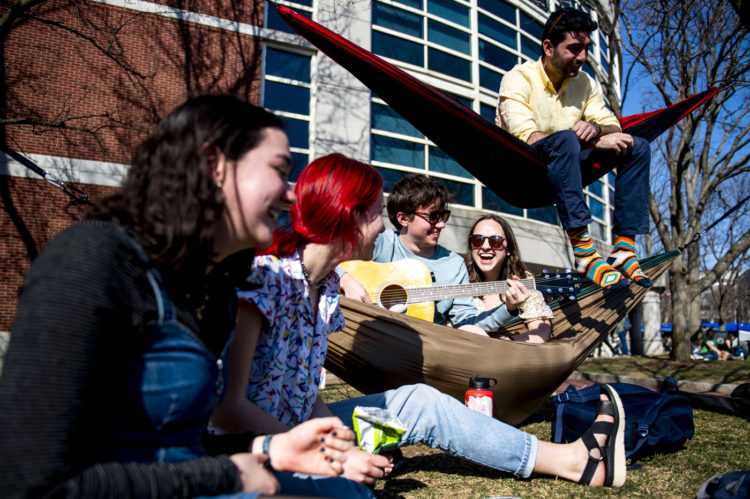Within the rich diversity of CSSH programs and people, students have many ways to form communities for socializing, intellectual enrichment, and professional growth. For undergraduates, clubs within majors are hubs for social and co-curricular activities, as are college-wide organization such as the International Relations Council. Leadership and mentoring groups such as the peer mentors, CSSH Ambassadors, and Student Advisory Council offer opportunities for students to share experiences and provide perspectives. Across the university, there are over three hundred official student clubs and organizations for undergraduate and graduate students to find like-minded peers or discover new interests.
OPPORTUNITIES & PROGRAMS
The CSSH Ambassadors work to highlight and publicize areas of student/faculty research, experiential education, and global opportunities through programming and outreach initiatives to increase visibility of the College of Social Sciences and Humanities at Northeastern University.
CSSH Circle is a peer mentoring program that connects new international students and dedicated continuing student program assistants (PAs). PAs are partnered with a small group of incoming international students guiding them as they transition academically and socially into the CSSH, Northeastern University, and Boston.
The CSSH Student Advisory Council is comprised of student representatives from each major in the college. The Council functions as a focus group and think tank for the Dean and other college administrators when they seek student perspectives on new and ongoing College initiatives. The Council provides an opportunity for CSSH students to let their voices be heard, whether through the expression of ideas of their own or in collaborating with the ideas of CSSH administrators. The time commitment is small and the student perspective is invaluable.
Located within academic departments, CSSH Peer Mentors are upperclass students who guide incoming first-year students within their majors. Each department’s peer mentoring program looks a bit different, but the goal is the same: helping first-year students and transfer students feel connected to their departments and supported by peers during the first and second semester on campus. This is your chance to build community within your department. Here is your opportunity to connect with new students and to help make them feel a part of their major and the NU campus.
CSSH Department Peer Mentors – College of Social Sciences and Humanities (northeastern.edu)
CSSH Virtual Mentors serve as a key contact for CSSH N.U.in and NUStart students during their first semester. The goal of the CSSH Virtual Mentor Program is to help students form a connection with the College of Social Sciences & Humanities before they arrive on campus in January. CSSH Virtual Mentors communicate and meet virtually with N.U.in and NUStart students throughout the fall semester and discuss topics such as academic engagement, course registration, and transitioning to Boston.
Northeastern is home to more than 325 student organizations. Student government associations allow students to develop leadership potential. Academic and professional societies allow students to network with accomplished professionals in various fields. There are athletic clubs, performing arts groups, cultural organizations, and everything in between.
https://cssh.northeastern.edu/cssh-student-organizations-2/
CSSH coordinates Teaching Assistant opportunities for two courses taught by Co-op Coordinators and Academic Advisors. One is EESH2000 Professional Development for Co-op, the 1 credit course students take to prepare for co-op. The other is INSH1000 Social Sciences and Humanities at Northeastern, the 1 credit course students take when they start on Northeastern’s campus in a spring term.
Students in the College of Social Sciences and Humanities may serve as Undergraduate Teaching Assistantships (UGTAs) in classes in their area of study to enhance their experiential learning and to build their leadership skills.
OPPORTUNITIES & PROGRAMS
Northeastern is home to more than 325 student organizations. Student government associations allow students to develop leadership potential. Academic and professional societies allow students to network with accomplished professionals in various fields. There are athletic clubs, performing arts groups, cultural organizations, and everything in between.
https://cssh.northeastern.edu/cssh-student-organizations-2/
Northeastern’s Graduate Student Government (GSG) is the official voice for graduate students at Northeastern University. GSG addresses concerns, raises awareness, and promotes graduate student life on Huntington Avenue and abroad.
The Center for Advancing Teaching and Learning Through Research (CATLR)’s Graduate Student Liaison Network brings together selected Graduate Student Liaisons from departments across Northeastern to share ideas, needs, and resources for graduate students.
The Northeastern PhD Network is an organization designed to build community among PhD students. The Network provides students with support and resources to enhance their educational experience and career preparation.
Learn about NU traditions, events, student groups, and more on the Northeastern Student Life website.

